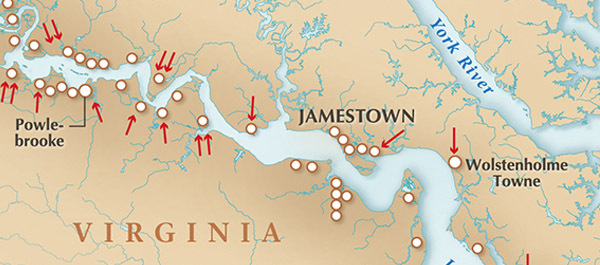
"Tidewater Wars, 1622" Topic
1 Post
All members in good standing are free to post here. Opinions expressed here are solely those of the posters, and have not been cleared with nor are they endorsed by The Miniatures Page.
Please be courteous toward your fellow TMP members.
For more information, see the TMP FAQ.
Back to the Renaissance Media Message Board
Areas of InterestRenaissance
Featured Hobby News Article
Featured Recent Link
Top-Rated Ruleset
Featured Showcase Article The Editor tries out a boardgame - yes, a boardgame - from battle-market magazine.
Featured Workbench Article
Featured Profile Article For the time being, the last in our series of articles on the gates of Old Jerusalem.
Featured Book Review
|
| Tango01 | 27 Feb 2015 10:25 p.m. PST |
"IN THE EARLY MORNING of March 22, 1622, Captain Nathaniel Powell was tending to his various responsibilities at "Powle-brooke," his home on the south side of the James River. Also on the estate were Powell's wife, Joyce, who was "great with childe," and seven of his tenants. Powell was one of the first English settlers to build a life in the New World, having sailed to America in 1606. He was a man of stature and importance in the Virginia colony from its earliest days. A competent surveyor, a "valiant Souldier," and a successful planter, Powell had served as acting governor of the colony and was a member of the Virginia Council of State. Contemporaries described him as a "worthy Gentleman," "an honest and useful Inhabitant" who was "universally valued and esteemed." He also was known for maintaining cordial relations with the Indians. M But that March morning, without warning, a horde of screaming "salvages"—Powhatan Indians—descended on his plantation. As the legendary John Smith later described the event, the Indians "not onely slew him and his family, but butcher-like hagled [mangled] their bodies, and cut off his head, to expresse their uttermost height of cruelty." Carrying Powell's head as a trophy, the Indians hurried on to the nearest farms and settlements. Powell and his people were reportedly the first to die, as the same scene played out many times over an 80-mile-long "front." By day's end, war parties had wiped out at least 25 percent of Virginia's colonists. News of the uprising swiftly crossed the sea and sent shock waves throughout England. Referred to then as the Virginia Massacre, it was the first act in a long series of Indian-Anglo conflicts that came to be called the Tidewater Wars…"

Full article here
link Amicalement
Armand |
|

